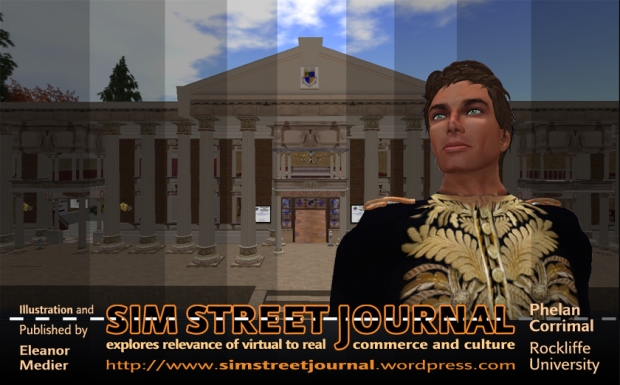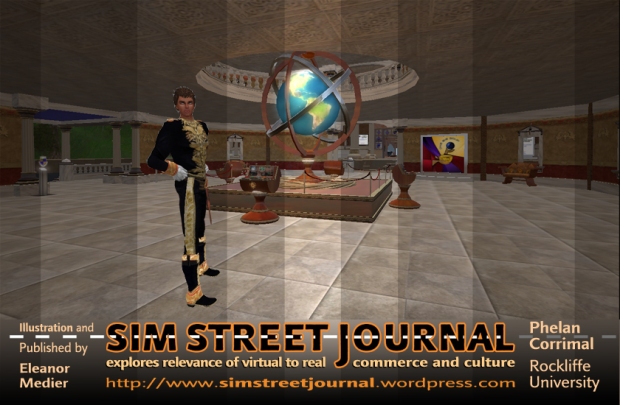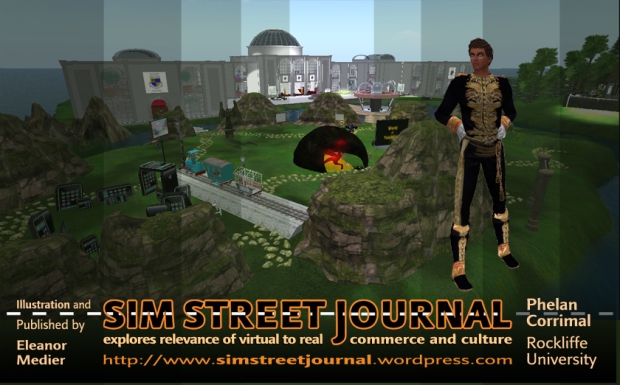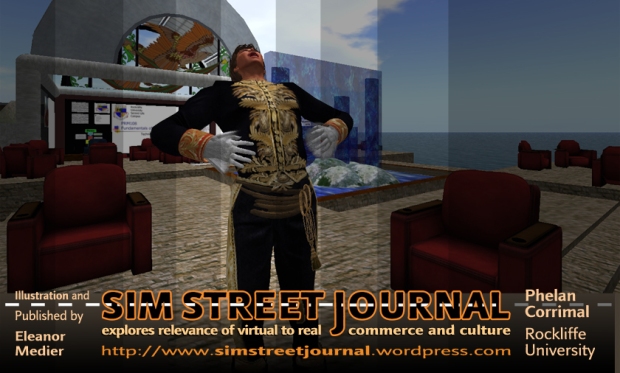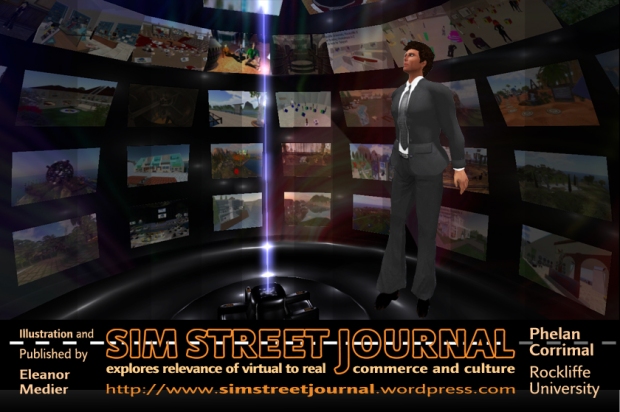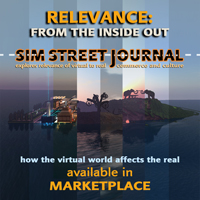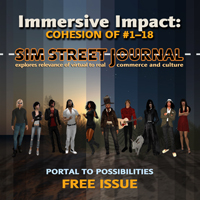Experience from Adaptation by Phelan Corrimal
Phelan Corrimal (Kevin Feenan), President, Rockcliffe University
Having just celebrated our seventh anniversary, we owe our longevity mostly to the people that believe in us. There is a decent-sized base of those who work on Rockcliffe projects and believe that education doesn’t have to belong only to educators, but to anyone willing to teach. Not funded by any outside educational, state, or national organization, we started, and have grown, as a grassroots volunteer organization.
Rockcliffe started after I had been in Second Life® for about three months. I was looking for something to do with the platform, as I knew this wasn’t just about gaming. For six months prior in real life, I floated my CV around to various places to teach business courses part-time. Without much response, I decided to just create something in SL.
I looked at the way education was being taught here, and knew the standards could be higher, as I had developed training programs for other business schools and clients. I applied those techniques in SL, initially teaching about 2-3 times a week. Before I knew it, we were up to about 800 in the student group, and three additional instructors. It got out of hand (in a good way) really quickly!
Although I still put together courses for real world clients, teaching is teaching, whether it is in a virtual environment or in ‘real life.’ The skills used, and the learning developed, have practical real world applications. Fundamentally, its not about ‘teaching in SL.’ Its about sharing experience to help others gain knowledge—everything else is simply a tool used to help that process.
Whether I introduce myself as Phelan Corrimal, President of Rockcliffe University Consortium or Kevin Feenan, Management Consultant, these are simply two aspects of who I am. They aren’t SL and real life—it is all experience that I bring to the table whenever I’m doing business, be it Information Management or Education. The same goes for all volunteers at Rockcliffe; they use, and develop, skills in a virtual setting that are relevant outside.
The lack of bias in SL is one of the biggest teaching advantages. Here, people don’t judge for what others look like (except furies—smiles). Rather, people are judged based on words and deeds. It does not matter if you are in a wheel chair or blind or able-bodied or black or white or latino or gay or straight or Muslin or Christian or anything else that we use in terms of normal world demographics.
By removing bias, suddenly those who have wanted to teach, and never had the opportunity, can excel at something they normally would not have a chance to do. SL leveled the playing field. Anyone that spends a reasonable amount of time to learn the technology can do miracles in here, if they choose to. There is a social network of individuals that seek experiences they can’t necessarily get elsewhere.
While there were over 800 Universities and Colleges in SL at one point, a large number of them were individual professors experimenting to see if the platform would fit their curriculum. Probably about 20-25% were actively supported by their administrations. Actually, a lot of brick and mortar schools don’t realize what some of their professors are up to!
So when the cost of providing service to their students went up, many sims disappeared because the administrations weren’t willing to pick up the tab. I don’t really consider that fizzling; I consider this to be price-sensitivity, where we have an education system that requires teachers to put—out of their own pockets—money to improve the school system.
These people are hard-working and dedicated to their professions. In a number of ways, I consider it to be more a failing of the education system rather than evidence of a concerted approach to utilizing this technology. Most administrations do not see that a virtual world can make a real difference in student knowledge, development, and retention.
The link between education and business is critical. Misunderstanding between them is not limited to SL. It stretches from the normal world. Business must understand that to compete, it needs a staff able to handle high-knowledge-requirement technology. You don’t get that without a solid educational system to provide for both general training and ongoing development.
Life-long-learning is everyone’s responsibility. But, that can’t happen if business, government, and education don’t work together. This collaboration gives people the opportunity to keep pace with the technology on which competitiveness is based.
Companies seem to pride themselves in human resource departments that hire “the best and brightest.” Yet they then never put money into those same people to keep their skills current. This is a huge risk for businesses because if you train people too well, they may take-off for greener pastures. But if no one takes responsibility for their education, how can a business compete other than to constantly hire and fire people who no longer fit a development profile that will allow a business to succeed?
You can’t build on a base if there is no base to start out with. Education is in everyone’s best interest, otherwise there is a huge divide between those able to be competitive, and those marginalized because they become no longer relevant to an economic system that demands high-value workers.
People learn by having an opportunity to make mistakes in a supportive environment. SL is a safe place where you are free to be yourself—or someone else—and be challenged. If you have never had a business, why not try one here first? Set up a store, learn about accounting, marketing, socializing, programming, systems analysis, customer service, project management, human resources, economics, math, science, or languages—its all here. Quite often, people don’t like putting themselves “out there” in real life. In SL, you are just an avatar. People find it much easier to experiment behind a mask of anonymity. This is a great place for establishing apprenticeships and forming peer-to-peer relations.
Asynchronous communication makes sense and fits the way peoples’ lives run. For example, if you can’t find a good mentor locally, nothing stops you from finding one in New Zealand or England or Brazil. Even language isn’t a barrier anymore, as translators are getting better at interpretation in real time.
The two key things SL is best for are role-play and simulation. SL is also is a playground. We don’t have a preset curriculum of classes. We believe in self-directed education, and allow people to try things they maybe have never done before.
For the last couple of years, Rockcliffe hasn’t grown too much. SL enrollment, especially in areas of education, has dramatically declined since the great blood-letting of 2009, when Linden Labs gutted communities, education, nonprofit discounts, the teen grid, and the TOS—all within 12 months. Linden Labs lost one of the largest marketing teams in the world that year. As a lot of educational and nonprofit groups got massive price hikes, they stopped using SL, and started using OpenSim more. The net result was that all those tens of thousands of people that education was bringing into SL suddenly stopped.
We do plan to grow larger. We will get involved with OpenSim and Unity3D, have agreements with several companies to beta test their software, and are involved in gaming platforms. Right now about 80% of what we do is centered on SL. Within five years I expect that percentage to be down around 40%.
As an educational base, other platforms allow more control over what is going on, and can manage costs more effectively.
The Ohio college system, for example, I believe has their own statewide grid, launched in 2010. This year the Canadian province of Newfoundland also formed its own grid. Though there are more launched grids today, I’m not privy to how they are used. My understanding is that they are closed systems.
The first step in adapting to a new paradigm is always the hardest. People need to wrap their heads around it, and that takes time. So, I assume that it will be a year or two before courses can be easily “hot-swapped” between school systems, as they have to figure out how to use the tools effectively first. Keep in mind, this is still a technology where a relative handful of people have the high-end knowledge and skills to really know how to get the best out of the environment.
Most new people will initially try to duplicate things they are already familiar with before they embark on doing things in a whole new way—things that can never be done in a normal classroom setting.
Currently we can only market by word-of-mouth. We have plans for some adventurous services. But for now, until we can secure funding for programs, we are not doing the ‘in your face’ type of advertising for students. If we have something good going on, people will come.
The community has come together based on two different things that we offer: 1) programs / discussions / forums, and, 2) the activities that involve us. Not everyone wants to attend a discussion forum every Monday evening at 6 pm, but they do want to be informed and have the option. We keep the channels of communication open, and let people decide for themselves.
The student group is currently 2200. Every year, we edit out about 800 who haven’t logged into SL for over a year. That way, we aren’t filling up in-boxes with notices, or what might be considered spam. If someone is gone for a full year, chances are, they have moved on to different things.
Rockcliffe is funded by me, or rather, from my Management Consulting firm, Knomaze Corporation. Since it is a one-person operation, I guess it’s one and the same. 🙂 But as an in-world group, we formally incorporated as Rockcliffe University Consortium in 2008.
We don’t charge for classes, but do appreciate donations. Rockcliffe requires about $30,000 USD to maintain. Fortunately, we are asked to consult on a number of projects, which paid for a good portion of overhead in the last few years. When these contracts are not available, we have to make-do.
The rules of business are still the rules of business. Business can only build up as far as the customer base will allow, and upon revenues from those inspired to open their wallets.
Virtual education marketed solely within SL is a loss-leader. The demographics are wrong. The social culture is wrong. Many people expect everything to be available for free, or as close to free as possible.
For a virtual education business to work, don’t just rely on people inside SL. Go outside the box. Compete on a level playing field with a common understanding of education’s value. SL should be part of an organization’s mix. This a tool the same as Sococo, Venuegen, Microsoft Office, Adobe Photopaint. There are some business models that work well inside the box, but services like education aren’t really one of them. To be successful, pull in real money to make a go of it. For example, there is a huge psychological difference between me asking for $1500L versus $5USD, even though they are roughly the same, after factoring the exchange rate. Most donations are in the $100-500L range. People feel really good about donating that amount, even though it would take about 30,000 people donating $250L each, to make Rockcliffe sustainable within SL without having to go outside for funding. Most groups just don’t get that much traffic!
However, I would not be doing this if I did not believe in a larger picture. Rockcliffe isn’t about SL. It is about tearing down barriers to success. Virtual worlds have enormous potential. We will see the real initial stages of that potential in the later part of this decade. SL is a technology whose time came too early, but whose implications are just now starting to be understood by some real entrepreneurs.
One of the biggest things we are looking for is to develop a programming pool that can take Rockcliffe to the next stage of evolution. Funding can help, but so can volunteers interested in building something never seen before in education. We need six to ten programmers to create a social network site, along with associated mobile apps, and then help integrate them into various virtual worlds / gaming simulations. Parts of our plans involve very cutting-edge applications. Some are old school enterprise class back-end infrastructures that can use service-oriented architectures. It is a real mixed bag—not mixed bag—mixed good! This will be part of Rockcliffe’s future, if we can get some of these initiatives off the ground. Definitely, we would like to talk to anyone interested in doing something unique in social networking and VW integration!
World of Teachcraft was an experimental project, conducted with Frontrange College, about two years ago. We learned that program needs dedicated WOW players to utilize it properly. To do activities with new players presents some disruptive elements that take away from the learning experience. Hopefully we will have another run at this, now that Mists of Panderia is out.
Inside the Avatars Studio is a vehicle for people to voice their views of the metaverse, and what it means to be an avatar. How do people see themselves, and how does an avatar address needs not fulfilled in any other way? This is a simple invitation to smart people for an hour chat with someone that isn’t going to tell them what the questions will be in advance. 🙂
As I tell most of the guests before we go to air: feel free to go down any tangents you want. We aren’t being held to a script. Rather, hopefully, conversations lead the guest to realize new things, as do those listening. I generally get about 8-10 topics of conversation, and then just sit and talk to them, as if we were in a coffee shop and no one else was there.
SL is like a Pub—a good place to meet some really great people. However, discussions and forums need to be taken beyond SL—sort of like TED Talks. Ideas are worth spreading, ideally, to more than just 10-20-or-30-some people. Consider SL to be IRC on steroids. Then it is up to those involved to take things to the next level.
Philip Rosendale was never given credit for the competitive advantage of SL. Not that it is a 3D-MMORPG, but it is a collection of diverse communication technologies that, on their own, are difficult to master. Philip brought these technologies together for anyone willing to spend a little time to master the basics, can create from their imaginations.
The biggest challenge to grow Rockliffe is sustaining a balanced momentum of providing opportunities. While we have one or two people who can do just about anything on a limited scale to grow the organization, we need about a dozen people for marketing, student services, curriculum development, finance, community liaison, co-developers with other universities, etc. Many hands make light work. But, often it is the same 20-30 volunteers who do these activities all the time. And we need to expand in ways where it doesn’t become lopsided.
For example, if we were to suddenly get 20 marketing people wanting to blog and write articles about Rockcliffe, all at once, we’d fall short in student services and educational content, etc. If we have too many faculty people, then we may not have the marketing folks to help promote those activities.
It becomes a very delicate balancing act to grow the organization and maintain momentum, but in a way that keeps the organization providing a decent level of service for the size that we are at.
The simplification of, until then, very complex technologies, is really what SL best gives to people. It makes the complex almost simple to implement on any budget.
We have very good experience with a few people that are core members of Rockcliffe. But by the same token, I’ve also had people flake out in agreeing to take on specific responsibilities and then, rather than asking for help, just disappeared. As a volunteer organization, you have to expect that from time to time. But still it becomes a challenge as you don’t really know someone until you’ve had a chance to work together constructively. And its not limited to SL. The more people are committed to the community, the more they are likely to complete their commitments.
Education needs support from businesses and community. Whether NCI, Rockcliffe, Dreams, or any of many organizations, these are places who spend hundreds of real dollars each month to provide essentially a free service. Contributions, partnerships, anything that makes this job easier, is welcome to help these groups do one of the more difficult jobs in SL.
Many groups, especially one like Virtual Abilities, go beyond SL and help people with real disabilities, giving them a sense of purpose. Essentially this means being part of the community rather than just looking out for the short term. 5-10 minutes of time, even every so often, goes a long way.
—Phelan Corrimal (Kevin Feenan), President, Rockcliffe University
See www.urockcliffe.com
••••••••••••••••••••••••
PLEASE SEE THE IN-WORLD SPONSORS FOR SIM STREET JOURNAL #9
Enjoy different, but related, issue versions: online and in-world (available at the Second Life® SSJ office (Innu 40, 36, 1650) or here as a PDF: sim street journal #9.
Back issues are available on MARKETPLACE).
— The in-world magazine has topics that relate to those who understand the virtual context, including photographs, parallel articles. It has tabs for information landmarks, and web links.
— The online magazine expresses what the virtual world offers the real one. It is a mirror that reflects parallel articles, hot topics, and provides more links.Contributions are encouraged if covering topics relevant to real world readers.
Contributions are encouraged if covering topics relevant to real world readers.
Comments and opinions are also encouraged: simstreetjournal@gmail.com
Advertising Opportunities to reach subscribers and viewers both in-world and out
– – – – – – – – – – – – – CONTACTS:
Sim Street Journal explores the relevance of virtual to real commerce and culture.
ONLINE: https://simstreetjournal.wordpress.com/
FACEBOOK: https://www.facebook.com/simstreetjournal
IN-WORLD: http://maps.secondlife.com/secondlife/Innu/40/36/1650
MARKETPLACE: https://marketplace.secondlife.com/stores/148961
EMAIL: simstreetjournal@gmail.com
——————-
Eleanor Medier (avatar of Liane Sebastian)
BLOG: http://www.eleanormedier.wordpress.com
FACEBOOK: https://www.facebook.com/eleanor.medier
ASN: http://www.avatarsocialnetwork.com
EMAIL: eleanormedier@gmail.com
——————-
Liane Sebastian wears an editor’s hat, designer’s coat, and artist’s shoes.
BLOG: http://www.publishingpioneer.wordpress.com
PORTFOLIO: http://www.lianesebastianillustration.wordpress.com
LINKEDIN: www.linkedin.com/in/lianesebastian
FACEBOOK: https://www.facebook.com/liane.sebastian
EMAIL: lianesebastian9@gmail.com
Sim Street Journal explores the relevance of second to first life. © 2014 by Eleanor Medier, Sim Street Journal. Articles cannot be reprinted without permission.
